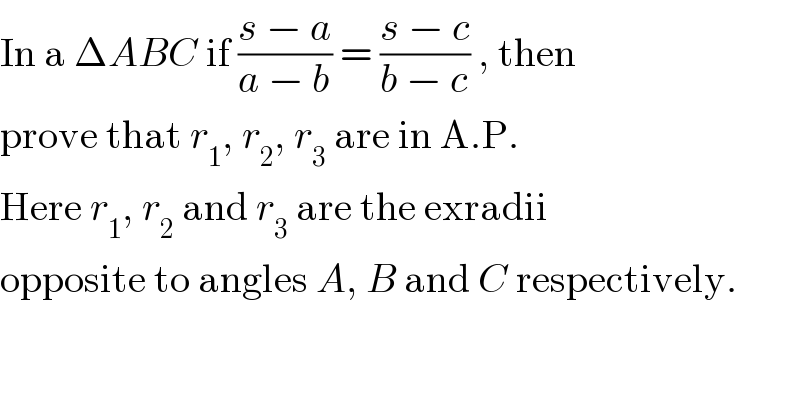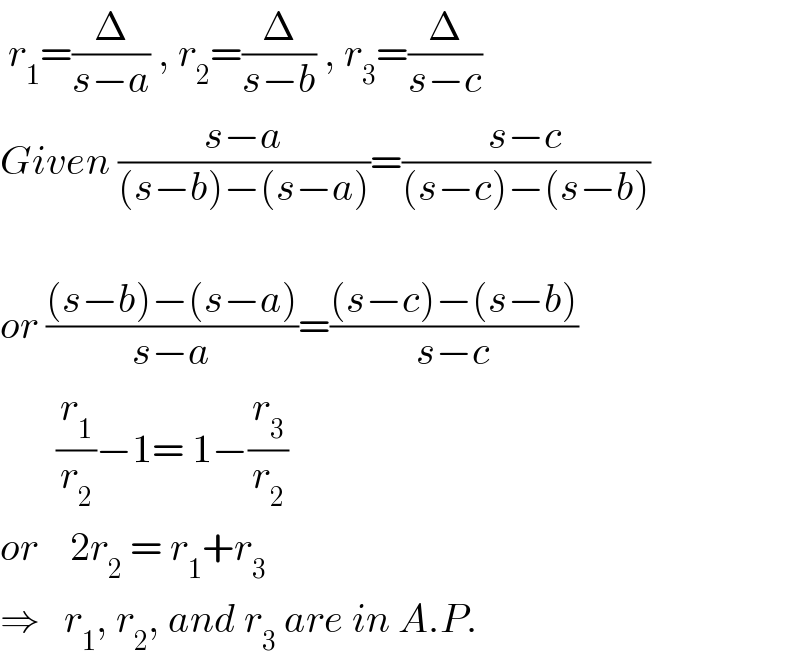Question Number 16359 by Tinkutara last updated on 21/Jun/17

$$\mathrm{In}\:\mathrm{a}\:\Delta{ABC}\:\mathrm{if}\:\frac{{s}\:−\:{a}}{{a}\:−\:{b}}\:=\:\frac{{s}\:−\:{c}}{{b}\:−\:{c}}\:,\:\mathrm{then} \\ $$$$\mathrm{prove}\:\mathrm{that}\:{r}_{\mathrm{1}} ,\:{r}_{\mathrm{2}} ,\:{r}_{\mathrm{3}} \:\mathrm{are}\:\mathrm{in}\:\mathrm{A}.\mathrm{P}. \\ $$$$\mathrm{Here}\:{r}_{\mathrm{1}} ,\:{r}_{\mathrm{2}} \:\mathrm{and}\:{r}_{\mathrm{3}} \:\mathrm{are}\:\mathrm{the}\:\mathrm{exradii} \\ $$$$\mathrm{opposite}\:\mathrm{to}\:\mathrm{angles}\:{A},\:{B}\:\mathrm{and}\:{C}\:\mathrm{respectively}. \\ $$
Answered by ajfour last updated on 21/Jun/17

$$\:{r}_{\mathrm{1}} =\frac{\Delta}{{s}−{a}}\:,\:{r}_{\mathrm{2}} =\frac{\Delta}{{s}−{b}}\:,\:{r}_{\mathrm{3}} =\frac{\Delta}{{s}−{c}} \\ $$$${Given}\:\frac{{s}−{a}}{\left({s}−{b}\right)−\left({s}−{a}\right)}=\frac{{s}−{c}}{\left({s}−{c}\right)−\left({s}−{b}\right)} \\ $$$$ \\ $$$${or}\:\frac{\left({s}−{b}\right)−\left({s}−{a}\right)}{{s}−{a}}=\frac{\left({s}−{c}\right)−\left({s}−{b}\right)}{{s}−{c}} \\ $$$$\:\:\:\:\:\:\:\frac{{r}_{\mathrm{1}} }{{r}_{\mathrm{2}} }−\mathrm{1}=\:\mathrm{1}−\frac{{r}_{\mathrm{3}} }{{r}_{\mathrm{2}} } \\ $$$${or}\:\:\:\:\mathrm{2}{r}_{\mathrm{2}} \:=\:{r}_{\mathrm{1}} +{r}_{\mathrm{3}} \: \\ $$$$\Rightarrow\:\:\:{r}_{\mathrm{1}} ,\:{r}_{\mathrm{2}} ,\:{and}\:{r}_{\mathrm{3}} \:{are}\:{in}\:{A}.{P}.\: \\ $$
Commented by Tinkutara last updated on 21/Jun/17

$$\mathrm{Thanks}\:\mathrm{Sir}! \\ $$
